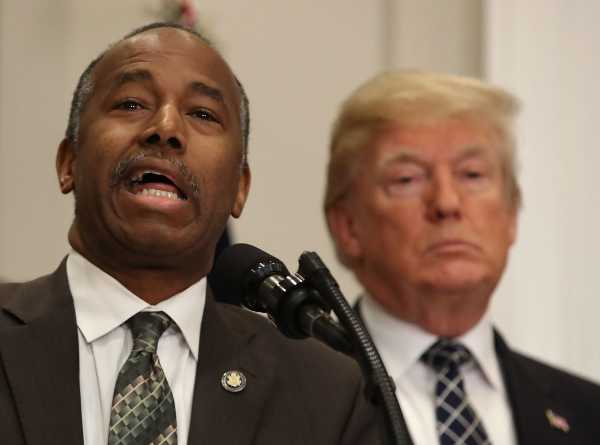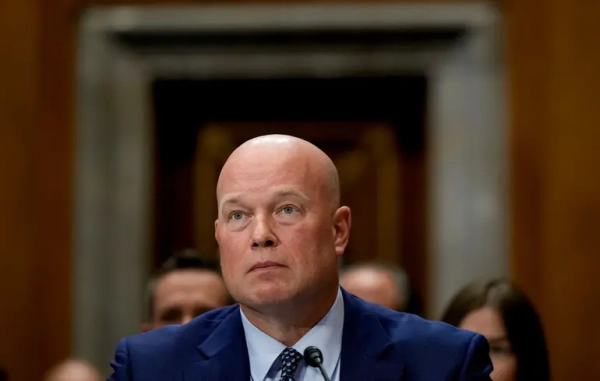
Two years into the Trump presidency, one of the most effective parts of the administration has been its efforts to reduce the federal government’s role in promoting civil rights regulation. A recent report from the Washington Post suggests that this effort could soon enter a new phase, as the government considers a large-scale rollback of measures protecting marginalized groups from discrimination.
On January 3, the Post reported that the administration was considering “a far-reaching rollback of civil rights law that would dilute federal rules.” The report noted that a recent internal memo from the Justice Department encouraged civil rights officials to look at how anti-discrimination guidance, some of which is decades old, could be removed or changed and what the effects would be.
This memo is reportedly the first step in a larger review that could see some of these guidance completely rescinded in the coming months. The Post notes that the Education Department and Department of Housing and Urban Development are also looking at similar guidance in their respective agencies.
The Justice Department memo explicitly targets federal civil rights guidance that focus on mitigating “disparate impact”— the concept that a practice or system can be discriminatory if it is found to disproportionately affect minorities, even if the policy itself is not rooted in intentional discrimination.
“Disparate-impact discrimination is not a simple question of discrete outcomes; on their own, divergent results do not prove discrimination,” the Atlantic’s Adam Serwer explains. “Rather, the regulations prohibit behavior that would discriminate if there are other ways to achieve the desired objective, or if there’s no valid interest being pursued.”
Conservative media outlets like National Review and organizations like the Heritage Foundation have long criticized disparate impact, arguing that the concept causes federal officials to be overly focused on race. They counter that the government should only focus on addressing explicit discrimination.
It is unclear exactly how far the Justice Department is into its review, but the report has alarmed civil rights groups. “Disparate impact is a critical framework to secure opportunities and equality for people of color, women, and others struggling under the weight of present-day and historical discrimination,” Jeff Robinson, deputy legal director for the ACLU, said in a statement last week.
“It is shameful that this administration is considering dismantling tools to fight discrimination rather than using its power to foster respect for the dignity and equality of all people,” Robinson continued.
It’s possible that the changes under consideration won’t ultimately materialize. But even if the moves to rescind disparate impact guidance do not play out as the Post describes, the report suggests that the administration is eager to launch new fronts in a multi-pronged effort to roll back federal civil rights protections implemented to help marginalized communities across the country.
“Disparate impact” policies are already under fire from the Trump administration
The civil rights protections highlighted by the Post fall under the Civil Rights Act of 1964, which prohibited discrimination on the basis of race, sex, national origin, and religion. The most significant set of civil rights protections passed since Reconstruction, the legislation and its amendments have been used to enact regulations at federal agencies, all aimed at protecting minorities from discrimination.
Disparate impact is considered a part of the law, meaning that the federal government is obligated to protect citizens from both implicit and explicit discrimination. In a recent piece, the New York Times Editorial Board noted that disparate impact is also part of federal voting rights laws and the Fair Housing Act, adding that the Trump administration would ultimately need the help of Congress if it wanted to change these laws.
But protecting minority groups from disparate impact has been enshrined in a number of regulations enacted by the executive branch, and many of these efforts could be undone at the agency level.
The Trump administration’s interpretation that regulations should solely apply to intentional discrimination would not necessarily require that disparate impact standards be completely removed. But the fact that removing the language is being considered suggests that the administration does not just want to avoid dealing with claims of disparate impact, it wants to erase the concept entirely.
That decision would render prior federal efforts to reduce racial disparities in areas like school discipline and housing access excessive and unnecessary, ultimately paving the way for their removal.
The administration most recently laid out its case against disparity-focused policies in a December report that called for ending guidelines on racial disparities in school discipline implemented by the Obama administration. In that report, federal officials claimed that the disparate impact standard “may lead schools to adopt racial quotas or proportionality requirements” in an effort to prove that discrimination does not exist.
The Post explains:
The school discipline move is just one part of a broader push against civil rights policies undertaken by the Trump administration. Last summer, the Department of Housing and Urban Development filed a notice that it was revisiting its disparate impact rule, and HUD has also stepped back from investigating housing discrimination cases.
This effort has included a combination of new rules issued by the administration and the rescinding of older regulations issued under President Barack Obama. The moves have not been restricted to any one particular minority group, but rather have touched on issues including transgender rights, policing, housing, and education.
These efforts often take months and involve multiple steps before a rule is issued or revoked. In February 2017, for example, the Trump administration announced that it would stop supporting Obama-era guidance protecting transgender students and allowing them to use locker rooms and bathrooms aligned with their identity.
A few months after backing away from that guidance, the administration also moved to bar trans people from serving in the military. In October, the New York Times reported that the administration was effectively trying to define transgender “out of existence” by considering defining gender as “a biological, immutable condition determined by genitalia at birth.”
Efforts to curb trans rights occurred alongside other efforts to roll back federal civil rights enforcement. In the spring of 2017, the Justice Department, led by then-Attorney General Jeff Sessions, announced that it would begin reviewing consent decrees — court-approved reform agreements between police departments and local or federal governments aimed at improving a department after constitutional violations and high-profile incidents of police violence.
Sessions previously argued that these agreements were negatively affecting police officers, claiming that police should be given more leeway to fight crime despite significant evidence of constitutional issues and racial bias in the departments subjected to consent decrees.
Shortly before being forced out of office in November 2018, Sessions further restricted when consent decrees could be issued, making it harder for these agreements to be reached and for officers to be held accountable.
The Trump administration has been pulling back from federal civil rights laws for months
The backlash over the news that the administration might consider removing the disparate impact guidance isn’t just a fight about specific federal regulations. It is also about a broader issue of how discrimination is often framed as the shameful behavior of individuals rather than systemic inequities that disadvantage minority groups.
The Trump administration has made it clear that it views its role as simply addressing the former, and its efforts to roll back systemic-oriented, disparity-focused enforcement fit into its larger push across agencies to restructure federal civil rights policy to align with this view. Some of these decisions, like the rollback of trans rights and school discipline policies, aim to directly erase measures enacted by the Obama administration.
The administration has proven willing to use unrelated incidents to advance this agenda, most notably in the recent decision to rescind the school discipline guidance. Conservative groups have repeatedly called for ending the guidance, but the most recent push to end the rules came after the February 2018 Parkland school shooting.
Civil rights groups noted that the decision was an illogical one, noting that the policy was aimed at helping black and brown students and those with disabilities who are several times more likely than the average white student to face harsh discipline for similar offenses. The Parkland shooting, on the other hand, was committed by a white former student who was not protected by the guidance.
Whereas revoking the school discipline guidance had conservative support from a range of groups and figures like Sen. Marco Rubio (R-FL), it’s unclear if changing federal disparate impact guidance would have as much support. A massive push against these policies has never been proposed, and the Post notes that conservatives have largely avoided raising the issue “out of concerns that the Supreme Court might disagree, or that such changes would be unpopular and viewed as racist.”
Previous challenges to disparate impact regulation have been unsuccessful. In 2015, the Supreme Court supported disparate impact, ruling 5-4 to uphold a disparate impact clause in the Fair Housing Act. But that decision did not include a stance on disparate impact regulations more broadly. With the retirement of Justice Anthony Kennedy, a swing vote in that case, and the subsequent appointment of Brett Kavanaugh, it is likely that other disparate impact regulation would be defeated if it reappears before the Supreme Court.
Civil rights groups argue that changing or completely eliminating disparate impact would harm marginalized communities. “Disparate impact is a bedrock principle,” Kristen Clarke, president and executive director of the Lawyers’ Committee for Civil Rights Under Law, told the Post.
Sourse: vox.com






